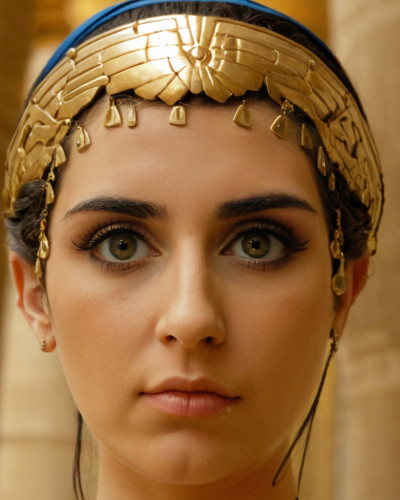Full Biography
Cleopatra VII (69–30 BC), the last active ruler of the Ptolemaic dynasty in Egypt, is one of history’s most fascinating figures. Born in Alexandria, she ascended to the throne at 18, co-ruling with her younger brother Ptolemy XIII, whom she later ousted. Uniquely among the Ptolemaic rulers, Cleopatra embraced Egyptian culture, learning the language and presenting herself as the goddess Isis to gain the loyalty of her subjects.
A master of diplomacy and political strategy, Cleopatra allied with Julius Caesar to secure her rule. Their relationship produced a son, Caesarion, whom she hoped would cement her dynasty’s connection to Rome. After Caesar's assassination, she formed a partnership with Mark Antony, a Roman general, sharing both a personal and political alliance. This union produced three children and created a powerful coalition against their mutual rival, Octavian.
Cleopatra and Antony’s forces were defeated at the Battle of Actium in 31 BC, leading to the collapse of their power. As Octavian advanced on Alexandria, Cleopatra reportedly took her own life, possibly using a snake bite, to avoid capture and humiliation. Her death marked the end of Ptolemaic rule and the beginning of Egypt’s incorporation into the Roman Empire.
Cleopatra was celebrated for her intelligence, speaking multiple languages and excelling in politics, economics, and military strategy. Though often remembered for her beauty, her real strength lay in her wit and ability to navigate the turbulent political landscapes of Egypt and Rome.
Her legacy endures as a symbol of power, charm, and determination. Artists, writers, and historians have continued to portray Cleopatra as an enigmatic figure, embodying both the splendor of ancient Egypt and the complex interplay of love and politics in her tumultuous life. Her story remains a cornerstone of discussions on leadership, gender, and legacy in the ancient world.
